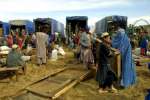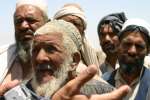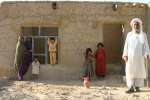UNHCR's Türk warns against growing politicization of refugee and asylum matters
News Stories, 8 October 2015
GENEVA, Oct 8 (UNHCR) – UNHCR's top International Protection expert warned today of growing risks to people fleeing war and persecution, and said a renewed spirit of commitment from governments worldwide to the core human rights and rule of law principles on which the international refugee system is based is becoming urgently needed.
In a speech in Geneva to UNHCR's annual Executive Committee meeting and looking at how protection of refugees and others is bearing up under pressure of today's almost 60 million people forcibly displaced people globally, Volker Türk, UNHCR's Assistant High Commissioner for Protection spoke of a worrying outlook, with asylum and humanitarian considerations too often becoming trumped by security and domestic ones.
Türk described in his speech a troubled global landscape of increased war and conflict, a worsening humanitarian funding crunch, some countries building fences or walls to keep refugees out, countries using deterrence to push people away or simply shift them onto the territories of their neighbours, miserable reception and living conditions that make it impossible for refugees to stay where they are, detention of asylum seekers including children, absence of schooling for children and – for adults – denial of possibility to work legally.
"Push-backs, building walls, increasing detention, and further restricting access, combined with few legal avenues to safety, will never be the answer," he said. "The impact is simply the diversion of refugee movements along other routes and the aggravation of already precarious situations in regions embroiled in conflict. Worse still, these measures compel more people who have nothing left to lose to risk dangerous journeys onward in the hope of finding eventual safety and stability."
The phenomenon of people arriving in one place of refuge and then moving on out of desperation to others has come into sharp focus in 2015 with the well-over 500,000 sea arrivals seen in Europe, Southeast Asia, and elsewhere. In the case of Europe, many of the people arriving have been moving onwards from countries of initial disembarkation – and often there are tragic consequences along the way. Known deaths at sea and during journeys overland have already exceeded 3,000. People-smuggling has meanwhile become rife.
Türk paid tribute to what he called the "remarkable outpouring of public compassion and a groundswell of public support" seen in Europe and elsewhere this year in response to such arrivals, including from NGOs, faith-based organizations, political and spiritual leaders, private individuals and communities – including the many instances of people inviting refugees to stay in their homes or tourists handing out emergency care.
But he warned too that with the rapidly rising numbers of refugees and migrants in Europe and continued increases in the numbers of forcibly displaced people globally, today's biggest challenge had become "populist politics and toxic public debates, and the climate of fear they engender".
"This is often fuelled and abetted by irresponsible media reporting, lack of political and moral leadership, and xenophobia and racism," he said. "All of this suggests that the more fundamental crisis that we are facing today is a crisis of values – the same values that gave birth to the 1951 Refugee Convention in the wake of the atrocities of the Second World War."
UNHCR's Executive Committee comprises 98 member states who Türk urged to rise to these challenges with the same spirit of unity and political will, plus attention and resources that have seen previous large-scale international refugee situations being overcome. Help, he said, must also be expanded for the world's many internally displaced people, affected populations, returned refugees, and stateless people inside their countries of origin; The aim should be saving lives, ensuring safety, alleviating suffering, and restoring dignity. He also spoke about the need to build closer ties between displaced people and the communities that host them, who left unsupported can easily be overwhelmed. And above all, he said, countries must renew a spirit of working together to address problems that by their nature span borders and cannot be solved without vital international cooperation:
"We need an all-out effort to ensure that protection, and in particular the institution of asylum remains life-saving, non-political, and fundamentally humanitarian," he said, adding that the 1951 Refugee Convention recognizes in its opening lines that the problems of forced displacement cannot be achieved by countries working in isolation.
"This speaks to the most critical protection gap we are facing today – the need for a global compact on predictable and equitable burden and responsibility-sharing. In a world in turmoil, we need a sense of equanimity, purpose, and trust to make such a compact a reality."
The complete written statement on which Volker Türk's speech is based can be found here.






















































